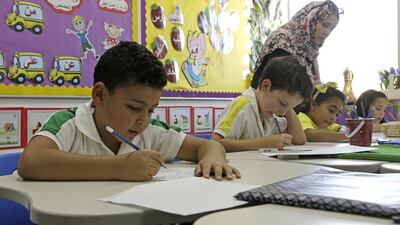ABU DHABI // Expatriate parents say hopes for their children to be fluent in Arabic are frustrated by education standards and teaching styles.
One of the key problems, parents claimed, was that Arabic lessons were often restarted to accommodate the yearly influx of new pupils.
They also felt that many students were not being taught Arabic in a way that would benefit them in everyday life, and that cultural education was fragmented and disconnected.
One expat parent, who lives in Abu Dhabi, felt western children who wished to learn Arabic were often at a disadvantage because educators had not been addressing the transient nature of the population.
“New children arrive every year, and that means schools start their Arabic teaching all over again to accommodate the newcomers,” he claimed.
“So the children are always stuck at level one. My two children love school but not Arabic lessons because of the teaching style. Most of their Arabic teachers were taught in Arabic, so it’s impossible for them [the teachers] to adapt to teaching foreign students Arabic.”
According to a 41-year-old British mother – a linguist whose daughters, aged 7 and 10, are enrolled at an English curriculum school – three years of tuition have left her children no closer to being proficient in Arabic. She blamed it on teaching styles.
“They can tell me names of fruits and vegetables, types of weather and zoo animals but cannot answer a question such as ‘how old are you?’ or order a soda in a cafe,” she said.
“I appreciate the difficulty in teaching a transient population but, in the drive to standardise teaching, there has been too much focus on content, which it is easy to measure progress against – such as lists of vocabulary – at the expense of actual, functional language.”
Many expats agreed that learning Arabic was beneficial to children and should be compulsory in the UAE.
However, a British parent of a 15-year-old boy, who attends an Abu Dhabi private school, said: “The current standard of Arabic teaching is way below what it should be and students are ill-prepared for the National Grade 12/Year 13 compulsory exam in Arabic and for the IB/A levels.
“My son enjoys learning Arabic, provided the teacher is able to control the class and uses a variety of teaching methods. The two go hand-in-hand.”
He also questioned whether Arabic was taken seriously and sufficiently prioritised within the education system.
“Last year, my son was left without an Arabic teacher for most of the year due to a series of unfortunate circumstances,” said the parent. “Had it been a core subject like maths, I am confident the school would have compensated for the lack of instruction in a more efficient way.”
Rosie Seldon, a marketing consultant whose two children, aged 9 and 11, attend Cranleigh School Abu Dhabi, was pleased that her children were learning Arabic but felt that different teaching methods could be used. “They currently do between two and three hours a week of classroom learning in school, which is quite a lot,” she said. “I would recommend that they do it in a more activities-based way.
“It would be nice to have activities and immersive-based learning with local speakers and move away from formal classroom learning.
“Children could have ‘Arabic buddies’ that they practise with, do sports or cooking in Arabic – this would reflect the way people learn languages in the real world.”
newsdesk@thenational.ae

